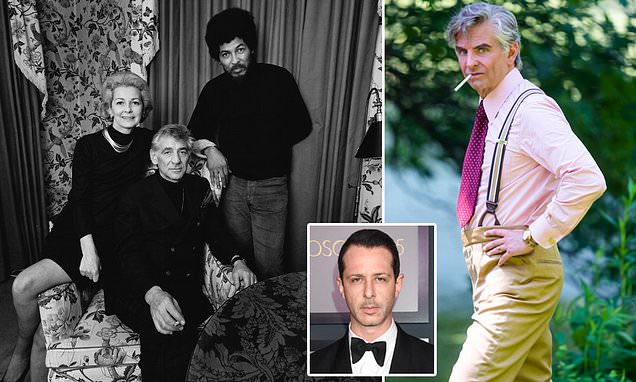
- Bradley Cooper’s upcoming film Maestro, a biopic about legendary composer Leonard Bernstein, leaves out key moments in his life, say sources who saw a screener of the film
- The 1970 party Bernstein and his wife hosted in support of the Black Panthers, which was called the ‘most notorious episode’ in his career, is not in the film
- Actor Jeremy Strong, who was widely reported to be starring in Maestro as Bernstein’s biographer John Gruen, is cut out of the finished film
Legendary composer Leonard Bernstein was in the middle of one of the most famous high-society racial controversies of the 20th century when he held a fundraiser at his Manhattan penthouse to support the Black Panthers in January 1970.
But Bradley Cooper, director and star of Netflix’s upcoming Bernstein biopic Maestro, has opted not to feature the infamous party meant to raise money for the ‘Panther 21’ – the group’s 21 members jailed and charged with conspiring to kill police and plotting to bomb parts of New York City.
The fallout from the party, held at Bernstein’s duplex apartment on the Upper East Side, was incendiary, with The New Yorker magazine dubbing the moment as the ‘most notorious episode’ in Bernstein’s career and writer Tom Wolfe’s account of the party popularizing the phrase ‘radical chic.’
A source who saw an early screener of the film told DailyMail.com, ‘The party came to define Leonard Bernstein in the public eye and yet Bradley Cooper avoids it completely.’
The Panther 21 were all eventually acquitted of charges of planning bomb and rifle attacks on NYPD precincts in The Bronx and Manhattan and on the Queens Board of Education office. The 1971 trial collapsed after it was revealed police infiltrators had key roles in the organization of the campaign.
Bernstein, one of America’s most iconic 20th century composers and conductors, was musical director of the New York Philharmonic and composed Broadway musicals West Side Story, On the Town and Candide. He died, aged 72, in 1990.
Maestro, whose producers include Steven Spielberg and Martin Scorsese, is Cooper’s follow-up film to his 2018 smash hit A Star is Born.
It will be released in the fall but had an early test screening last week at New York’s Paris Theatre.
The source who attended the early screening said, ‘Even though Bernstein’s left-wing politics attracted suspicion from the FBI and the political establishment, Cooper doesn’t address them at all in the film.’
The Black Panthers party is not the only thing absent in Maestro, the source revealed.
Emmy-winning Succession star Jeremy Strong, who was widely reported to be starring in Maestro as Bernstein’s biographer John Gruen, is not featured in the finished film.
‘Apparently Bradley Cooper and [co-writer] Josh Singer decided to entirely remove the character from the script so Jeremy Strong never ended up filming any scenes,’ according to the source.
‘It was a bold choice from Bradley not to ultimately include the part for Jeremy. He is still listed in the movie on Wikipedia and other sites but he’s not actually in it.’
Maestro chronicles Leonard Bernstein’s tempestuous marriage to his actress wife Felicia Montealegre, played by Carey Mulligan, from their initial meeting at a party in 1946 until her death from lung cancer in 1978.
The film has also faced backlash from the Latinx community in reaction to the English actress Mulligan playing a Chilean-American.
Felicia and Leonard Bernstein’s children, Jamie, Alexander and Nina supported the casting, with Jamie, 70, releasing a statement which read, ‘We’re absolutely thrilled that Carey Mulligan will play our mother in Maestro.
‘Carey will surely capture Felicia’s unique combination of wit, warmth, elegant beauty and depth of emotion.’
Maestro does not flinch from portraying Bernstein’s multiple affairs with men, including clarinetist David Oppenheim, played by Matt Bomer, and musician Tom Cothran.
However, absent from the film is any mention of Bernstein’s decade-long relationship with Japanese insurance worker Kunihiko Hashimoto whose intimate letters with Bernstein were included in the 2019 book Dearest Lenny: Letters from Japan and the Making of the World Maestro.
Maestro also features a scene of Bernstein doing cocaine at a decadent 1970s party.
In addition to his own music, the film features the composer dancing and singing along to the 1985 pop song Shout by Tears for Fears.
The biopic was filmed in Los Angeles, New York and at Ely Cathedral in England.
The film is produced in black-and-white when depicting Bernstein’s meteoric musical rise and early marriage to Felicia in the 1940s and 1950s and then changes to color for the latter decades of his life.
Cooper has previously spoken of Maestro being his passion project in an interview with Mahershala Ali for Variety’s Actors on Actors series.
‘I wanted to be a conductor since I was a kid,’ Cooper said. ‘I was obsessed with it, [I] asked Santa Claus for a baton when I was eight.’






